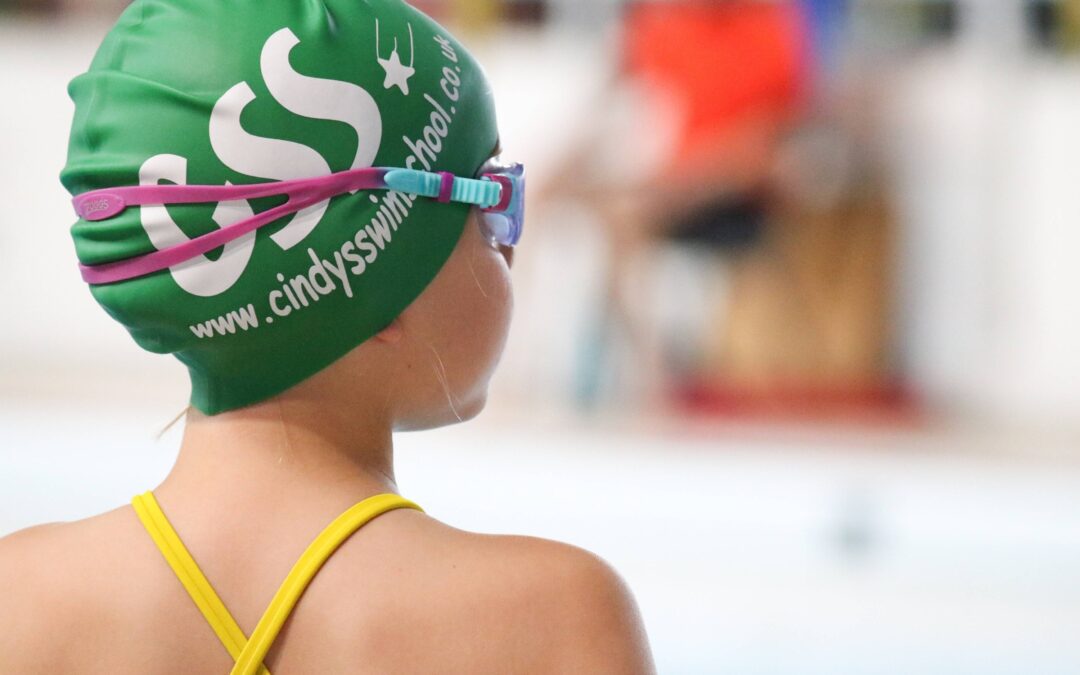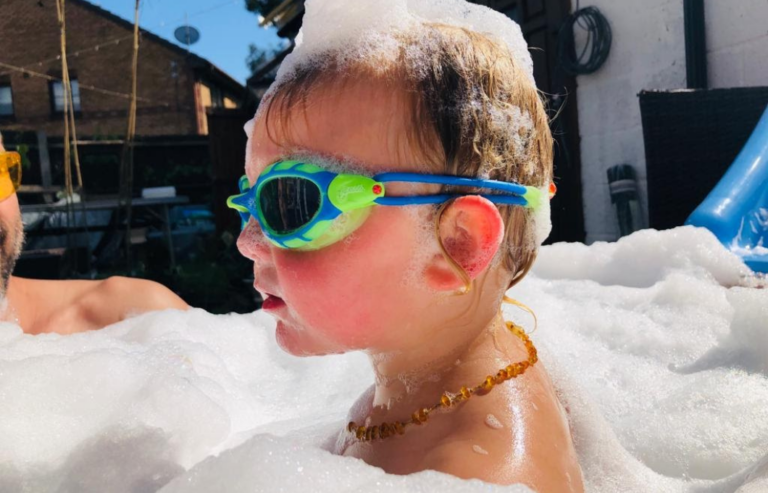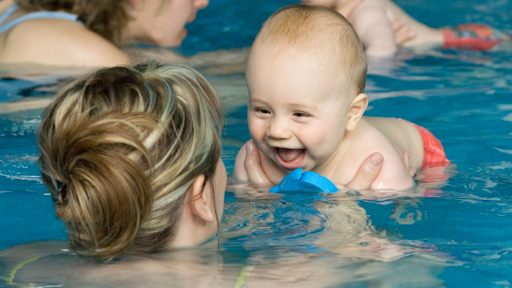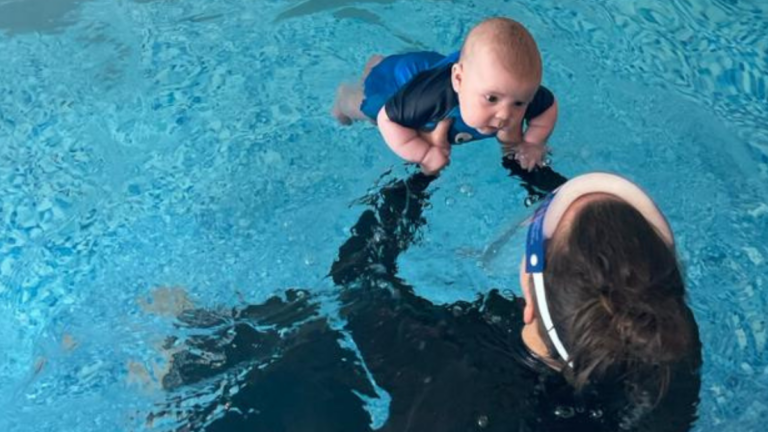How to put on a child’s swimming cap with long hair:
- Brush the child’s hair to remove any tangles.
- Tie the child’s hair into a ponytail or bun at the back of the head. Where you position the ponytail will help to place and stabilise the goggle straps.
- If the child has a fringe, ask them to sweep that upwards off the forehead and hold in place.
- Look out for: The length seam on the swimming cap should run lengthways along the head to maximise space.
- Stretch the swimming cap out over your hands (thumbs at the front) and place it over the child’s head, starting at the forehead and working your way back.
- Remove your hands and gently tuck the child’s hair into the swimming cap.
- Adjust the swimming cap so that it fits snugly over the ears but leave room at the forehead for goggles. (Swimming goggles must suction to the skin and if the swimming cap is in the way, the goggles will leak).
Other tips:
- We recommend using a silicone swimming cap. All Cindy’s Swim School caps are made from silicone as they are much more stretchy and easier to put on than latex caps.
- If, like me, you or your child has very thick and/or long hair, and you cannot get a regular swimming hat to hold it all in, long hair swimming caps are available. I bought one online, and although it looks a bit retro (think 1950s synchronised swimmers), it saves me the pain of having very heavy wet hair when swimming.
- If the child’s hair is very long, you may want to divide it into two ponytails before putting on the swimming cap. A top knot and a lower one will create a natural ‘valley’ for the swimming goggles strap to rest.
Why are swimming caps so important?
At Cindy’s, we love all things swimming! And swimming caps are a big part of being able to swim well and with ease, so we love them too. We have even incorporated them into our teaching program, all new swimmers receive a cap when they start lessons with us.
Another way we like to keep our swimmers engaged and motivated, is by providing our colour-coded caps as a mark of achievement as they progress through the different distance and stage awards. The array of colourful swimming caps splashing around in the pool, always brings a smile to our faces on a busy swimming shift!
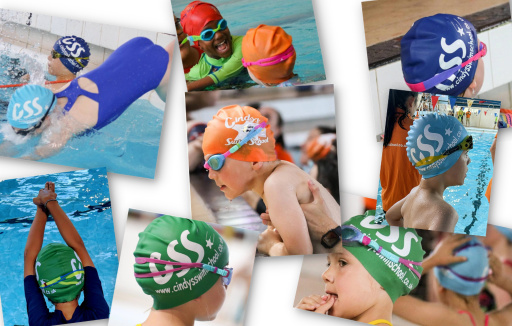
Cindy’s Silicon Swim School Cap
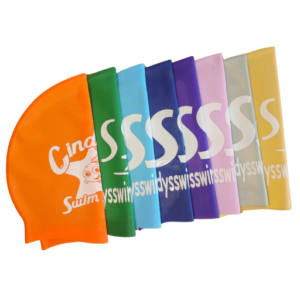
Each child who takes lessons at Cindy’s Swim School receives a complimentary swin cap.
These are high-quality, easy-to-use caps, made from silicon, which is less sticky and nicely stretchy. You can purchase them from our online shop.
£5.00
Why do we insist that all our swimmers wear swimming hats?
For various practical reasons of course!
Parents, if your child is resistant to wearing a cap, this will hopefully help persuade them. If they are still unsure, why not hand it over to our trusty awesome swimming teachers, who are all very experienced in persuading hesitant swimmers to take the plunge with a cap on.
Swimming caps help you swim faster – All you have to do is look at any professional swimmer to know that swimming caps minimise drag in the water and aid in streamline swimming. Or as we tell the kids; ‘it help you to swim as fast as a speedboat!’
Swimming caps protect hair from chlorine – Chlorine is a disinfectant that is used to keep swimming pools clean and free of germs. However, it can also be harsh on hair, causing it to become dry, brittle, and (for very frequent swimmers) sometimes discoloured. Swimming caps help to protect hair from chlorine by creating a barrier between the hair and the water.
They keep hair out of the face – Swimming caps also keep hair away from the face and eyes, which will help children see clearly and concentrate without the distraction and irritation of hair getting in the way. Tucked away hair also helps goggles to suction better onto the face, minimising leakage and swimmers fiddling with their goggles. Bonus!
They stop hair getting weighed down with water – For those blessed with thick, curly and long hair, it can get very heavy when wet. Swimming caps make swimming easier and faster (with less drag) because your hair doesn’t get fully soaked. Caps also make drying your hair after swimming a lot quicker!
Swimming caps help to keep the pool clean – Hair sheds naturally, and swimming caps help stop that hair ending up in the swimming pool filters, resulting in a lot less mess for our pool maintenance teams.
They prevent hair from getting tangled – Long hair can easily become tangled in the pool, which can be uncomfortable and painful for children (and parents) to sort out later. Swimming caps keep hair tucked away and prevent tangles in the first place.
Swimming hats can help reduce the risk of ear infections – Kids who wear swimming caps that cover their ears benefit from a layer of protection against water entering their ear canals. Whilst some children won’t like the sensation of their ears being covered because it makes their hearing a little duller, it’s worth trying, especially if they’re prone to ear trouble or have grommets. Swimmers’ ear plugs for children have come on a long way and can be very helpful if your child suffers from any of the above ear issues. Have a chat with your doctor if you feel you need them.
In summary, swimming caps for kids are important and it isn’t difficult to help children get them on quickly and gently.
We find at Cindy’s Swim School that because all our pupils wear swimming hats, and it is non-negotiable, we don’t encounter much resistance to the idea. By making the caps a reward for their swimming achievements, different coloured caps carry kudos and are an incentive to swim well. We’d recommend to all parents, on holiday and at home, that you make wearing a swimming hat the norm, and not an optional extra.
Afew tips to get your swimmer excited about wearing their swimming cap:
- You can make choosing a new swimming cap (different colours or styles) a reward for great swimming.
- Show them how all the best professional swimmers wear caps because they make you go faster and have more fun!
- Motivate them with an out-the-pool treat if they wear their swimming caps the whole lesson. Talk to your swimming teacher about it, so that they can help you implement the treat incentive.
Now you know that swimming caps are amazing, the next step is knowing how to put one on quickly and efficiently. Below we show you our handy tricks, so that you never struggle with a swimming cap again!



